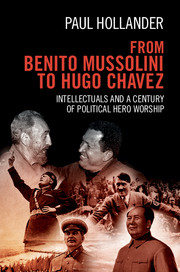Book contents
- Frontmatter
- Contents
- Preface
- 1 Introduction: Intellectuals and Politics
- 2 Mussolini, Fascism, and Intellectuals
- 3 Hitler, Nazism, and Intellectuals
- 4 Stalin, Rakosi, Soviet Communism, and Intellectuals
- 5 Western Intellectuals, Mao's China, and Cambodia under Pol Pot
- 6 Castro, Che Guevara, and Their Western Admirers
- 7 Other Dictators and Their Admirers in More Recent Times
- 8 Conclusions: The Personal and the Political
- Index
7 - Other Dictators and Their Admirers in More Recent Times
Published online by Cambridge University Press: 19 January 2017
- Frontmatter
- Contents
- Preface
- 1 Introduction: Intellectuals and Politics
- 2 Mussolini, Fascism, and Intellectuals
- 3 Hitler, Nazism, and Intellectuals
- 4 Stalin, Rakosi, Soviet Communism, and Intellectuals
- 5 Western Intellectuals, Mao's China, and Cambodia under Pol Pot
- 6 Castro, Che Guevara, and Their Western Admirers
- 7 Other Dictators and Their Admirers in More Recent Times
- 8 Conclusions: The Personal and the Political
- Index
Summary
Kim Jong Il is not the playboy, womanizer, drunk and mentally deranged fanatic “Dr Evil” of our press. He is a homebody who doesn't socialize much, doesn't drink much, and works at home in his pyjamas … He most enjoys tinkering with his many music boxes, sitting on the floor … He is prudish and shy, and like most Korean fathers, hopelessly devoted to his son.
Bruce CumingsBashar [al Assad] is basically a principled man. He is very unassuming … His voice is not the commanding type, yet what he has to say holds our attention because of his appealing sincerity … he is essentially a morally sound individual, someone who has the best of intentions, even if clumsily pursued at times.
David W. Lesch[H]aving created a new model of popular revolution, based for the most part on non-violent tactics, Iran may yet provide us with a desperately needed model of human governance for a third world country.
Richard FalkThere have been no dictators in more recent times comparable to those discussed earlier, neither in regard to their impact and historical role, nor the amount of adulation they elicited from Western intellectuals and others. Nonetheless some dictators of lesser notoriety and impact did find a smaller number of devotees, and were targets of similarly misplaced reverence. This being the case, it is safe to say that the impulses and illusions that in the past gave rise to political hero worship persist, at any rate in an attenuated form.
Although the popularity of, and interest in, this miscellaneous group of dictators has been far more limited (with the exception of Hugo Chavez, who enjoyed great popularity), it is of some significance that their appeals and attractions closely resemble, and sometimes duplicate, those of the more widely admired figures of earlier times.
We will be looking here at a mixed group of dictators of different personalities, beliefs, and policies, but sharing strong nationalistic sentiments. Hugo Chavez of Venezuela and Omar Torrijos of Panama were self-styled radical socialists with strong anti-American attitudes who did not perpetrate large-scale political violence or create highly repressive political systems. Torrijos was not nearly as well-known abroad and popular as Chavez, nor was he, like Chavez, an accomplished demagogue.
- Type
- Chapter
- Information
- From Benito Mussolini to Hugo ChavezIntellectuals and a Century of Political Hero Worship, pp. 244 - 288Publisher: Cambridge University PressPrint publication year: 2017



